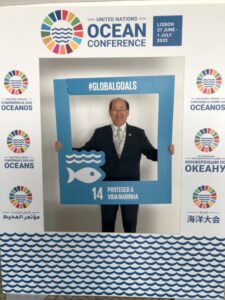
In an interview with HANSA, IMO’s Secretary General Kitack Lim talks about the balance of technological benefits and safety concerns, start-ups, efforts for decarbonisation and digitalisation, the need for cooperation, geopolitical issues and effects of the war in Ukraine. By Michael Meyer[ds_preview]
SMM is opening its doors again. Do you have a specific message for the maritime industry on that occasion?
Kitack Lim: Shipping is changing – and we have an opportunity to be a part of that change and to help steer the industry along the path of sustainability. Decarbonization, digitalization and automation must go hand-in-hand with a just and equitable transition, with a focus on the people involved – the maritime professionals, including seafarers so as to ensure the sustainability of the industry.
Although this change brings challenges – it also brings opportunities. I am pleased to say that the industry itself is at the forefront of exploring and embracing these opportunities.
We have to recognize that the decarbonization transition cuts across all aspects of shipping – from new vessel designs and the supply and use of fuels, to safety matters, port operations and training of seafarers. And we must ensure a just and equitable transition, recognizing the need for collaboration, cooperation within the industry and among countries as well as support for skills and technology development in developing countries. This is an issue for all in the sector.
Sharing of experiences and the exploration of new technologies will be part and parcel of SMM. These dialogues need to continue beyond SMM in and across the maritime sector, as close collaboration is the most effective means by which to elicit change.
How satisfied are you with the recent developments at IMO (and its committees) with regard to environmental regulation? With an eye on the COP26 climate conference, could there not have been »more« in terms of tighter environmental regulation?
Lim: I appreciate the work of all Member States who have continued to progress many matters, even during the pandemic, through virtual meetings. The adoption of the short-term measure on carbon intensity in 2021 is a testament to the spirit of cooperation and collaboration among Member States, recognising the need to act. With the intervention of the short-term measure shipping’s emissions are projected to peak in 2030 and decline. The commitment to further consider mid- and long-term measures through an agreed road map is important to highlight. With the work on alternative zero and low carbon fuels underway shipping is poised to make significant reductions in greenhouse gas emissions.
It is important to bear in mind that IMO is a Member State organization with 175 Member States. Countries and regions have differing priorities and needs. We need to ensure everyone has an opportunity to be heard when we develop regulations. The impacts of proposed measures must be considered – alongside ensuring the relevant technical matters are discussed. We must leave no one behind. We need a global solution to a global challenge.

Do you think that will work out?
Lim: I have every confidence Member States will continue to progress the work on GHG, leading to the adoption of the revised IMO GHG Strategy in mid-2023 and make further decisions over the coming decade to support energy efficiency in shipping and decarbonization.
COP 27 will provide an opportunity to report on IMO’s work to date and to highlight our several global projects which support capacity-building and information sharing in maritime decarbonization. The conversations and dialogues at COP 27 and other multilateral fora will undoubtedly feed into the discussions – and decisions – at IMO as we move forward.
What do you expect with an eye on maritime environmental regulation in the near and midterm future?
Lim: We are in the midst of a transition on a global scale, but there is steady progress being made towards a greener future. First of all, we will see the entry into force in of the carbon intensity measures – the short-term measures – on 1 November 2022. From calendar year 2023, ships over 5,000 gross tons will have to calculate their Energy Efficiency Existing Ship Index (EEXI) following technical means to improve their energy efficiency and to establish their annual operational carbon intensity indicator (CII) and CII rating. We have concluded and finalized the remaining guidelines which support the implementation of this measure.
We will see further measures related to GHG reduction. There has been progress in the development of marine fuel lifecycle GHG assessment guidelines; the impact assessment; and the mid-term measures (including technical and operational measures – integrating both various technical and carbon pricing elements).
The last MEPC session in June reiterated the strong commitment to finalize the revision of the Initial Strategy at MEPC 80 and increase the levels of ambition, while taking into account the needs of developing States, in particular SIDS and LDCs especially regarding the possible negative impacts of measures.

How satisfied are you with the recent decarbonization activities of the shipping industry itself?
Lim: I am very happy to see visible evidence that the maritime industry is keen to decarbonize and work towards a greener future. Many stakeholders are already undertaking innovative projects, others are initiating conversations about creating the support systems for this transition and there are many exciting initiatives within the shipping industry. I am sure the audience here at SMM will hear about some of the initiatives.
This year’s World Maritime theme is »New technologies for greener shipping«. This provides a great platform for everyone in the sector to share what they are doing and to highlight the technological advances that have already been made – as well as those on the horizon.
Our transition to a decarbonized future must be equitable and our focus has to be on making sure no one is left behind. The IMO is continuing to facilitate partnerships and projects in this regard through or Department for Projects and Partnerships such as IMO Norway Green Voyage Project. The global partnership is supporting developing countries, including Small Islands Developing States (SIDS) and Least Developed Countries (LDCs), in meeting their commitment towards relevant climate change and energy efficiency goals.
Do you support the creation of an innovation fund, as proposed by the maritime community, or the inclusion of shipping in a CO2 tax system?
Lim: I believe that all proposals to facilitate the decarbonization of shipping merit due consideration.
The IMO Member States are developing and assessing a »basket of candidate mid-term measures« – integrating various technical elements (for example, a GHG fuel standard and/or enhancement of IMO‘s carbon intensity measures) and carbon pricing elements (for example, a market-based measure).
Ultimately, Member States will decide on the best path forward. I believe that the conversations taking place at IMO meetings provide a technical platform for Member States to discuss and make an informed decision taking into account the impact of decisions on developing countries in particular on SIDs and LDCs.
Digitalisation and decarbonisation have been the most prominent topics for the industry for years. In view of the geopolitical developments, especially with an eye on the Russian war against Ukraine, is safety and security of merchant shipping coming back into focus?
Lim: Digitalization and decarbonization are important to ensure the sustainability of the maritime industry however, Maritime security has also remained a priority for IMO. The key maritime security regulations in SOLAS chapter XII and the International Ship and Port Facility Security (ISPS) Code have been in force since 2004. IMO has continued to roll out maritime security training across the globe, supporting States to boost their capacity to address maritime security threats.
IMO continues to support the implementation of the revised Code of Conduct concerning the repression of piracy, armed robbery against ships and illicit maritime activity in the western Indian Ocean and the Gulf of Aden Area, known as the Jeddah Amendment. Support is also provided to countries in the Gulf of Guinea region and the implementation of the Yaoundé Code of Conduct. There are regular workshops held to facilitate knowledge sharing and capacity building.
Of course, related to the IMO mandate with regard to the Black Sea and Sea of Azov is the safety of seafarers and shipping. In February, I established an Emergency Task Force within the Secretariat and we have been following the situation closely assisting seafarers where possible and also communicating with the relevant States with a view to the establishment of a blue safe maritime corridor. IMO continues to provide technical input to UN efforts to secure the transportation of grain from Ukraine.
What do you think policy-makers should do in this regard to protect civil shipping from unauthorised arrests or even shooting or hijacking?
Lim: The welfare of seafarers and the need for international shipping to move freely and unhindered is critical to the continuous operation of global supply chains, for the benefit of all peoples of the world. As I have said in the past, seafarers and shipping should not become collateral victims of larger political issues.
Regarding technical aspects, Maritime security is about risk assessment and putting in place corresponding mitigating security measures. The necessary legal framework for assessing and mitigating risks is essential in line with agreed international regulations for all relevant parties including Flag, port and coastal States.
IMO encourages a whole of government approach to maritime security, offering a programme of integrated workshops and tailored support to develop a National Maritime Security Committee, Risk Register and Security Strategy.
Our work is focused on assisting Governments to develop strategies to address maritime security threats and to provide the relevant capacity building support.
How should shipping itself react to these developments?
Lim: As an industry, we have a duty of care towards the seafarers who are at the heart of shipping. We must prioritize their safety and ensure that they have sufficient training and support.
At SMM, the role of start-ups will also be emphasised. How do we make sure that shipping benefits from innovations outside the sector, such as AI robotics etc.?
Lim: Technology and innovation are important for the future of maritime. New and advancing technologies will significantly affect shipping, creating a more interconnected and efficient industry more closely integrated with the global supply chain. New and advancing technologies have already brought about changes at all levels in the way ships are designed, constructed, equipped and operated, and have impacted the people who operate ships – and these changes cascade to other sectors such as ports, law, insurance, etc.
So should we look at it more objectively?
Lim: We need to balance the benefits derived from new and advancing technologies against ongoing and emerging safety and security concerns, the impact on the environment and on international trade facilitation, the potential costs to the industry, and finally their impact on personnel, both on board and ashore.
An important aspect is to ensure that maritime technologies are designed to bridge gaps, support the human element, reduce administrative burden and increase transparency in operations. Technology cannot be developed for technology’s sake alone – we must ensure that it fulfils a purpose and is compatible with a just transition.
What would you like to achieve until the end of 2023, when your term ends?
Lim: I want to progress on IMO’s key policy areas as planned with respect to climate change; digitalization and automation; safety and security; the human element, in particular seafarers; as well as technical cooperation and capacity building. In particular, we expect the mid- to long-term strategy towards decarbonization to be adopted in mid-2023.
The establishment of the International Day of Women in Maritime was a momentous occasion and I intend to continue to build on this momentum and improve the gender balance by making maritime more welcoming to women.
I am also looking forward to celebrating the 50th Anniversary of the adoption of the MARPOL convention, which has made such a tangible impact on our industry and changed the very face of shipping.
Interview: Michael Meyer


















